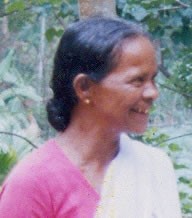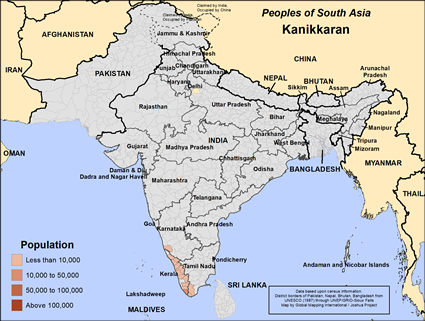Kanikkaran in India

Photo Source:
Copyrighted © 2026
Philipose Vaidyar All rights reserved. Used with permission |

Map Source:
People Group data: Omid. Map geography: UNESCO / GMI. Map Design: Joshua Project
|
| People Name: | Kanikkaran |
| Country: | India |
| 10/40 Window: | Yes |
| Population: | 25,000 |
| World Population: | 25,000 |
| Primary Language: | Kanikkaran |
| Primary Religion: | Hinduism |
| Christian Adherents: | 1.53 % |
| Evangelicals: | 0.00 % |
| Scripture: | Translation Started |
| Ministry Resources: | No |
| Jesus Film: | No |
| Audio Recordings: | Yes |
| People Cluster: | South Asia Tribal - other |
| Affinity Bloc: | South Asian Peoples |
| Progress Level: |
|
Introduction / History
The Kanikkan people live in Kerala and Tamil Nadu. Till the early 20th century, they dwelled in forests or near to forests in Thiruvananthapuram and Kollam in Kerala, and Tirunelveli in Tamil Nadu. Some say their language is a mixture of Tamil and Malayalam languages, but they have their own ancient tongue.
There are interesting stories concerning the genealogy and genesis of the Kanikkaran. Aryans who moved from north to south called them Kanikkaran, which literally means landlords, descendants of the kings. That is how they got their name. Another story claims they derived the name Malayarayan from Hindu mythological Sage Agasthya.
What Are Their Lives Like?
Although there are financially advanced people within this group, most are poor. Though they have agriculture as the main profession, they have a special affinity for fishing and hunting. Bows, arrows and spears are their main weapons. There may be many more Kanikkaran who are totally insulated from towns and modern living and lead a very simple life.
Those who were not accustomed to live anywhere permanently, made tree huts of bamboo and lived there. Now some live in the towns owing to their job and others live in Adivasi (native tribal) colonies built by government for them. The colony where they reside is known as Kani.
Each Kani colony has an elder. He is known as Kani Mooppan or Muttukani. He helps decide important matters. There is a shed where the elders assemble every day. This council of citizens collectively decides matters concerning agriculture, hunting and fishing. Their farming methods and lifestyles have drastically changed in recent decades.
They have unusual marriage customs. The Muttukani takes the initiative in marriages without considering the age of the groom or her family's desires. Draped in garments provided by the bridegroom, the bride is sent to bridegroom's presence with a glass of water. Only at this time do the bride and bridegroom see each other. Sometimes the bridegroom is an old man. Those who live in towns are not influenced by this old custom. They have embraced Hindu marriage customs.
When someone dies, relatives of the deceased collect funds for the expenses of digging the ditch and to pay the magicians who conduct the burial ceremonies. On that day the bereaved fast. There are ceremonies that last for 21 days from the day they break fasting by eating porridge. In the last 16 days they have ceremonial singing. They plant a coconut palm on the burial ground in order to rein in the spirit from attacking those in the house. Then they perform magical ceremonies. If the dead is a small baby, they bury the body inside the house since they believe small babies won't come out to hurt anybody.
Those who live in forests eat root vegetables and wild honey. Some drink alcohol, smoke and chew betel nut.
Kanikkars love music. They have many melodious songs. To hold off disease, they sing special songs known as Chattu songs (chattu means sanctification). To accompany these songs, they play a special musical instrument called Kokkara. They also use herbal medicines and magic for healing. They keep their healing herbs a secret from outsiders.
What Are Their Beliefs?
Although the elderly people believe in monotheism others believe in hill gods. They sacrifice chickens under trees by the shores of streams. Since most of them live in forests they don't think about any deities but their hill gods and goddesses.
What Are Their Needs?
Like all other peoples of the world, this people group needs the blessings and guidance that only Jesus Christ can offer.
Prayer Points
Pray for a "Book of Acts" type of movement to Christ among the Kanikkaran people.
Pray for the Kanikkaran people to understand and embrace that Jesus wants to bless their families and neighborhoods.
Pray for Holy Spirit anointed believers from the Kanikkaran people to change their society from within.
Pray for a movement in which the Holy Spirit leads and empowers disciples to make more disciples.